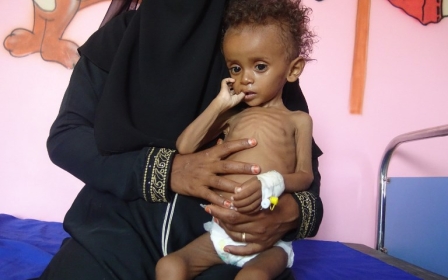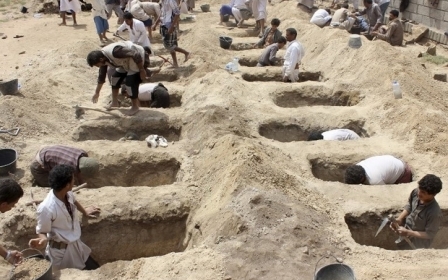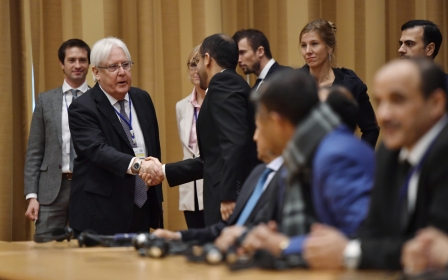Yemen mass prisoner swap underway, UN envoy says
A mass prisoner swap between Yemen's Houthi rebels and the government, a key issue at United Nations-brokered peace talks between the warring sides, is already underway, the UN special envoy to Yemen has announced.
First brokered by Martin Griffiths earlier this month, the prisoner exchange is one of the main sticking points at talks between the Yemeni government and the Houthis, in Sweden this week.
The deal "will be very very considerable in terms of the numbers that we hope to get released within a few weeks", Griffiths told reporters on Monday.
Griffiths did not provide a specific number of prisoners expected to be exchanged between the two sides.
However, the deal reportedly covers between 1,500 and 2,000 members of the pro-government forces and between 1,000 and 1,500 rebels, government official Hadi Haig said last week.
While the prisoner swap moves ahead, Yemen's warring parties have yet to agree on several major sticking points in the peace talks, including a ceasefire in Hodeidah and the reopening of Sanaa airport.
The talks are set to last until 13 December, however, and Griffiths said another round would be held early next year in an effort to end the war between the Iranian-aligned Houthi group and Yemen's Saudi-backed government, led by Abd Rabbuh Mansour Hadi.
"I'm hopeful that we can reach an agreement on de-escalation to reduce fighting in [Hodeidah and Taiz]. I am hoping that we can, we are not there yet," Griffiths told reporters.
Houthis want Hodeidah a neutral zone
Griffiths, who last week launched the first peace talks in two years, wants to avert a full-scale assault on the Red Sea port city of Hodeidah, now under the control of the Houthis.
The group controls most population centres in Yemen, including the capital Sanaa, which it seized in 2014 after ousting Hadi's government, now based in the southern port city of Aden.
The Houthis told Reuters they want Hodeidah, a lifeline for millions of people through which critical humanitarian aid enters the country, to be declared a neutral zone.
The Saudi-backed government said it is open to an international role in the seaport, but rejected a long-term UN presence in Hodeidah.
Foreign Minister Khalid al-Yamani told Reuters on Monday that the city should be placed under the control of the interior ministry's police forces as a matter of sovereignty.
"The concept of peacekeeping or some sort of permanent presence of the UN - boots on the ground - or making the city as neutral is something that we will never accept," said Yamani, who heads the Hadi government delegation in Sweden.
However, the Yemeni government is willing to accept the deployment of monitors from the UN Verification and Inspection Mechanism (UNVIM) in the port, the Houthis' main supply line and the entry point for most of Yemen's commercial goods and aid supplies.
It could also accept the transfer of port revenues to the central bank in Hodeidah instead of routing them to Aden, the minister said.
Confidence-building
Soaring prices have put basic commodities out of reach for many in Yemen, where more than eight million people are facing starvation. The central bank has struggled to pay public-sector wages on which many depend as foreign exchange reserves dwindle.
The UN is working with the International Monetary Fund and other partners to reunite the central bank after Hadi’s government moved it from Sanaa to Aden in 2016.
The Sweden talks aim at securing confidence-building measures in order to pave the way for a political process to end nearly four years of war that have killed tens of thousands of people.
"It is very difficult to convince parties who are fighting each other to put down their weapons and give their trust to the agreements that the others propose," Griffiths said.
He said the UN was still seeking "common ground" on efforts to reopen Sanaa airport.
Another sticking point is the establishment of a transitional governing body. Hadi's government insists the Houthis disarm first, while the Houthis say this would require an agreement on a unity government and a timeframe for the transitional period.
Middle East Eye delivers independent and unrivalled coverage and analysis of the Middle East, North Africa and beyond. To learn more about republishing this content and the associated fees, please fill out this form. More about MEE can be found here.




